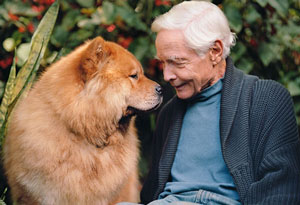Poet Laureate W.S. Merwin on His Connection to Nature

Merwin with his Chow, Peah.
PAGE 2
Sitting with him on his wooden porch, a canopy of leaves arcing graciously overhead, it's easy to connect Merwin's poetry to the primal beauty of his surroundings. You can follow that thread back to at least age 3, when Merwin, outraged at the sight of telephone repairmen hacking limbs off an oak in his backyard, attacked one of them in a rage, pounding the man with his fists. "I absolutely exploded," he tells me, shaking his head with a chuckle. "I screamed right out of the house and said, 'Let that tree alone!' I loved that tree. I would just go out and stand next to the tree, with my hand on the tree—and I did stand there for a long time because, I figured, we sort of understood each other."
Trees have been constant presences in his poetry, as enduring in verse as they are in nature. "On the last day of the world / I would want to plant a tree," he declares in "Place"; in "Oak Time" he writes: "a few oaks have fallen towering ancients elders / the last of elders standing there while the wars drained away."
"Rain at Night" is a poem about a lost forest, a lament that when something unique disappears, we can never really get it back:
This is what I have heard
at last the wind in December
lashing the old trees with rain
unseen rain racing along the tiles
under the moon
wind rising and falling
wind with many clouds
trees in the night wind
after an age of leaves and feathers
someone dead
thought of this mountain as money
and cut the trees
that were here in the wind
in the rain at night
it is hard to say it
but they cut the sacred 'ohias then
the sacred koas then
the sandalwood and the halas
holding aloft their green fires
and somebody dead turned the cattle loose
among the stumps until killing time
but the trees have risen one more time
and the night wind makes them sound
like the sea that is yet unknown
the black clouds race over the moon
the rain is falling on the last place
Dealing with such elemental things as trees, foxes, stones, shadows, the sky, at first glance a Merwin poem can seem to be simple. But then as you read it, the words wash over you. They build and accrue and unfold, each sentence coming alive, revealing its own secret heart. There is something rich and familiar in his language, a reminder that the resonance and beauty that can be glimpsed in a forest or a river are also part of us. "That's why I don't like using the word environment," he says. "I don't like the word nature. I don't like using them because they make it seem as though we're not nature. Anything we do to the rest of the world we're doing to ourselves."
Trees have been constant presences in his poetry, as enduring in verse as they are in nature. "On the last day of the world / I would want to plant a tree," he declares in "Place"; in "Oak Time" he writes: "a few oaks have fallen towering ancients elders / the last of elders standing there while the wars drained away."
"Rain at Night" is a poem about a lost forest, a lament that when something unique disappears, we can never really get it back:
This is what I have heard
at last the wind in December
lashing the old trees with rain
unseen rain racing along the tiles
under the moon
wind rising and falling
wind with many clouds
trees in the night wind
after an age of leaves and feathers
someone dead
thought of this mountain as money
and cut the trees
that were here in the wind
in the rain at night
it is hard to say it
but they cut the sacred 'ohias then
the sacred koas then
the sandalwood and the halas
holding aloft their green fires
and somebody dead turned the cattle loose
among the stumps until killing time
but the trees have risen one more time
and the night wind makes them sound
like the sea that is yet unknown
the black clouds race over the moon
the rain is falling on the last place
Dealing with such elemental things as trees, foxes, stones, shadows, the sky, at first glance a Merwin poem can seem to be simple. But then as you read it, the words wash over you. They build and accrue and unfold, each sentence coming alive, revealing its own secret heart. There is something rich and familiar in his language, a reminder that the resonance and beauty that can be glimpsed in a forest or a river are also part of us. "That's why I don't like using the word environment," he says. "I don't like the word nature. I don't like using them because they make it seem as though we're not nature. Anything we do to the rest of the world we're doing to ourselves."
Photo: Jill Greenberg



